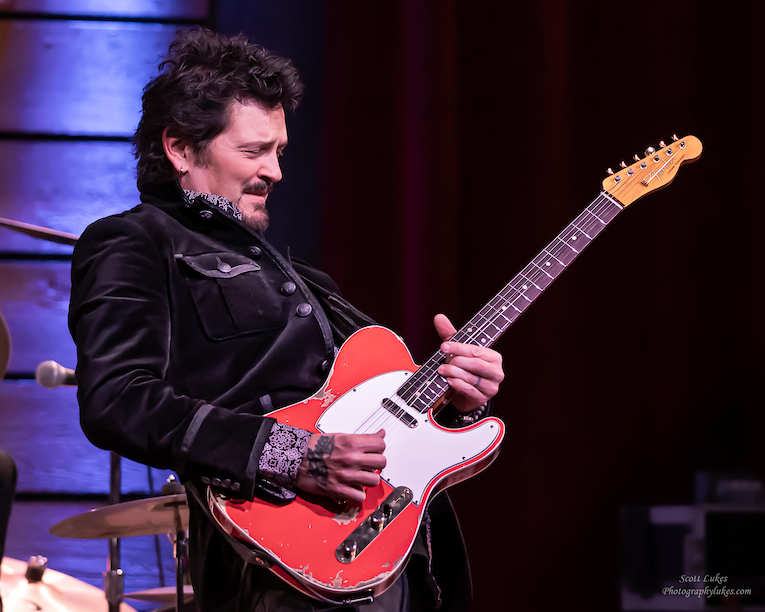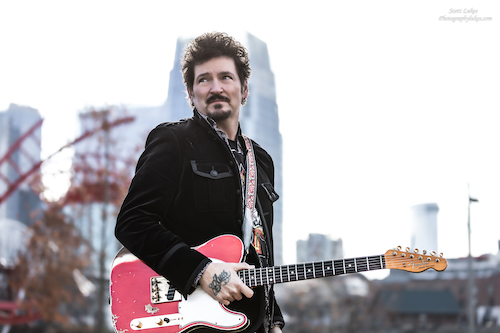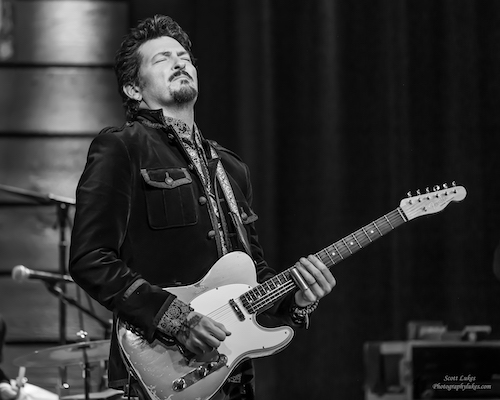
Photo: Mike Zito by Scott Lukes
By Martine Ehrenclou
Blues/rock guitarist, singer, songwriter, producer, co-owner of Gulf Coast Records, Mike Zito has been blazing his blues trail to critical acclaim. A multiple award-winner, Zito is nominated for two 2021 Blues Music Awards for “Blues Rock Artist” and “Blues Rock Album” for his November 2019 release, Mike Zito And Friends, Rock N’ Roll: A Tribute to Chuck Berry featuring blues/rock luminaries such as Joe Bonamassa, Walter Trout, Eric Gales, Robben Ford, Sonny Landreth, Luther Dickinson, and many more, out on Ruf Records.
With armfuls of solo albums to his name with his own fiery brand of blues/rock, Mike Zito also started his own record label in 2018, Gulf Coast Records with Guy Hale where he produces and records artists Albert Castiglia, Tony Campanella, Billy Price, Diana Rein, The Proven Ones, Jimmy Carpenter, Kid Andersen, Anthony Geraci, Kat Riggins, and more, many of whom are Blues Music Award winners and nominees.
Never one to sit back and wait for projects to come to him, Mike Zito made the most of a bad situation in 2020 after he and his band were taken off their European tour because of the pandemic. He recorded a new album, Quarantine Blues (2020) with his band all in quarantine, collaborating with rock legend Tracii Guns, written and recorded in two weeks, released March 28, 2020. And he decided to give that away free to devoted fans with a request to donate to the band since all of them had come home from the cancelled tour empty handed. He believed in taking care of his band in light of Covid-19 and cancelled tours.
After that, Zito created ‘Paying The Blues Forward’ a GoFundMe that raised money for other blues bands who were in the same situation with cancelled tours because of the pandemic. He said, “I don’t generally ask for a handout for myself but I’ve always helped raise money for other people and other causes.”
I asked Mike, “It seems like the concept of paying it forward is important to you.”
Zito responded, “Absolutely. I’m a big recovery sober person. I had such a crazy life in 50 years. It seems like multiple lives and lots of craziness. To be where I’m at now, I’m just like, ‘Man, I don’t need anything, and I have everything.’”
Mike Zito also revealed exciting new news, that he has a new solo album coming out, titled Resurrection, to be released on Gulf Coast Records at the end of August/early September 2021, produced by David Z. When asked if the upcoming album is blues/rock, Zito said, “Its certainly bluesy. It’ll probably get released in blues or rock blues because that’s what I’m known for, but it’s a darker sounding record, a song-oriented album.” Zito also explained that there are a couple of covers, one by JJ Cale and another by Blind Faith.
Zito continued about Resurrection and that he told David Z., “Please take this record and go somewhere I couldn’t think of with it.” He added, “I haven’t done anything like that in a long time. It’s really cool. I’m super excited about it. It’s a little more raw and epic.” Zito also admitted, “I’m a little scared because I’m on my own label and I don’t have anyone telling me, ‘That’s a terrible idea, don’t do that.’ It’s all on me. But it’s exciting.”

Photo: Scott Lukes
I said, “Well you’ve made some incredible decisions with Gulf Coast Records. It’s not like you’ve made any missteps.”
Zito answered, laughing, “None that you’re aware of.”
Laughing, I said, “All of the artists on Gulf Coast Records are outstanding. The quality of the artists’ albums really are remarkable.”
Zito said, “Thank you. We’re very proud of our artists and albums and we’re very excited about the future. We have some exciting things lined up this year. There’s going to be a new Albert Castiglia record—”
I jumped in, “That’s exciting.”
Mike said, “It’ll be super exciting. We have some new artists that are possibly coming to the label, we have a lot of things coming up, and if the world will—
I offered, ”Cooperate?” (Laughter)
Mike laughed and said, “Cooperate. When we can get on the road and tour it’s going to be wonderful.”
Curious about what makes this energetic, multi-talented man tick, I said, “It’s amazing to me that you continue to record albums of your own, plus you have a record company and produce artists for your label, you tour, put on guitar clinics, and there’s probably more.”
Mike answered with a laugh, “Probably the most is five kids and oh, God, animals. There’s always a lot going on.”
I stated the obvious, ‘You must thrive on the energy and creativity.”
Pausing for a moment, he said, “I think I do,” (laughing) “I must. I certainly want to make music like always, be a part of music. I always wanted to make records and be a part of that, producing, where I get to be a part of that whole process. I’ve always liked that process since I was a kid. I was recording on four track recorders and learning to do things like that. When I was 14 or 15, I didn’t know how to play guitar very well but I always liked songs or ideas and I wanted to record music. I struggled to learn songs so I played my own music. That was easier to play than learning other people’s music because I didn’t know what the hell they were doing.”
I interjected, “Well, you certainly figured that out on your album Rock n’ Roll: A Tribute To Chuck Berry.
Mike laughed and said, “That was a process for sure.”
I asked, “Tell me about that album. That was mind blowing with all those wonderful guitarists and you, yourself playing and singing on it. 20 guest artists on 20 songs. How did you come up with the idea? What was the process like? You’re nominated for a BMA for that album.”
Mike answered, “I’ve had the idea for about a decade. I’m from St. Louis, Missouri, so I grew up in the city, five blocks from a music store that was a guitar shop. I worked at that guitar shop for 10 years. Chuck Berry came in the store along with his son, Charles Jr. and Johnny Johnson, the piano player. One of the guys I worked with at that store played drums off and on with Chuck. As a kid, the only thing I knew was the city, the town, the area, the music store. There was no internet, there was no outside world; it was just that world. And the difference was, I’d buy a record, let’s say, a Van Halen record, and they seemed so far away. There was just a picture on this vinyl record. You couldn’t see their faces or what they looked like. So, there was this huge mystery. But in the case of Chuck Berry, I knew exactly what he looked like. I mean, he lived in town, he didn’t live in Hollywood, he wasn’t in New York. It wasn’t some mystery, it was a man that had been around my entire life.”
Zito explained that Chuck Berry knew the owner of the music store and he would come in. “I knew him from being local. I knew the songs were famous, but I didn’t really think about him being famous in the world. He would play the last Wednesday of every month at a St. Louis club called Blueberry Hill, which is still there. The guy who owned that place had a room called the Duck Room, which is still there, and it was in the basement. Chuck Berry played a concert in the Duck Room for over 20 years and it usually sold out. Local bands played in front of him. I did that several times.”
Moving on to later years when he moved to Texas, Mike shared that he realized how lucky he was to have grown up in St. Louis, “with all the great music, blues and rock, rock and roll, great guitar players and the history that rubbed off on you. Chuck Berry was so integral and I thought, no one’s ever really done a tribute to him.”

photo: Scott Lukes
Mike continued, “At the time I came up with the idea (for the record), Chuck Berry was still alive. I had always been friendly with his son, Charles Berry because he came in the music store a lot. He was the rhythm player for his father. I always thought it would be cool to include him. I got the green light from Thomas Ruf (Ruf Records) and thought there’s a way we could do it that would be different than anything else. I could ask all these guitar players and we could have it be a guitar-oriented record. How are we going to do this? You’re never going to get 20 artists on the same day to come to a studio and make a record.”
Asking himself who could conceivably play on the record, he shared that his friends are guitar players. A lot of them sing, some don’t. So he planned on recording all the tracks with his band and then send them out and see who could be a part of it. He said, “Well, let’s make it interesting, not just blues, just different. And that’s kind of what I went with. Almost everyone I asked said yes. Maybe a few for contractual reasons couldn’t do it. I would have liked to have had Samantha Fish and I was told her record company would not allow it. That was a bummer considering all the work we’d done together. But the majority of people I was able to get.”
I said, “Who you got to play was incredible”
Mike said, “I’m very excited about who I got. As far as the process, It was the most work I’ve ever done as a producer making an album ever. Because I didn’t get to record with any of these people. When I got the green light, I made a song list. I thought, ‘If you’re going to record 20 Chuck Berry songs and feature guitar players, if you don’t put ‘My Ding-A-Ling’ and ‘Johnny B. Goode’ on it, then to me, you’re not making a tribute album. You’re serving yourself; you’re not serving the legacy or who he was and what he did. I tried to make sure I had a combination of some cool songs. And then, who’s going to play on these songs?”
I asked, “How did you decide?”
Mike said, “I just thought about the artists. My first thing was Charlie Berry III. He’s the grandson. I’ve known him for some time now. Charlie was like, ‘I want to honor my grandfather’s music.’ He’s really a great dude. Then, I thought who else? Well, I’m going to call Joe Bonamassa and I’m going to call Walter Trout. I need these guys to play on the record. They’re my friends, they’re my heroes. In my head, one of these guys had to play ‘Johnny B Goode.’ It needed to be over the top. I asked Joe and he said, “No, Walter needs to do that and I’ll do “Wee Wee Hours.’ I tried to offer the artists two songs. I sent Sonny Landreth, who’s a good friend, “Havana Moon.” It just made sense. Sonny goes, “I’ve always wanted to record that song.”
Zito described matching the guitar players’ styles with the songs as a process that easily worked. Mike said, “I had all these great moments where things just really lined up, and I was able to do cool stuff with people. But then the recording process literally was, “Okay. I’m going to put the band in the studio, we’re going to go to work. We’re going to record these songs straightforward, not super out of context, and leave a lot of room for our guest artists to be themselves and to play their instrument and to make the songs different. And that’s what we did. And we recorded like probably in four days, we recorded 20 songs.”
Surprised, I said, “That’s a lot.”
Mike said, “Some (tracks) started to come back right away. Tinsley Ellis sends back ‘Promised Land’ and says, ‘Man, it was great.’ He has a studio in his home and just did a great job. Maybe two months later, we’re on the road and Joe Bonamassa sends me a text. He’s like ‘Hey man, I’m going to do this. I’m going to do this tune and just listened to it. Do you want me to play this traditional or do you want fire and fury?’ Those were his exact words. I said, ‘Dude, I want fire and fury. I want you to play way over the top.’ I mean, we already had Chuck Berry’s recording of “Wee Wee Hours’ that’s traditional. I was so happy about that. He sends the track back and now the track is totally different.”
After discussing how seamless and yet challenging the recording was with the 20 guitarists playing on the tracks, he said, “This was a labor of love because ultimately I really wanted to do a good job, I wanted the Berry family to be pleased, you know what I mean?”
He said that he asked for their blessing. “I don’t have contact with everyone but I talked to Charles and I asked, ‘How do you feel about me doing this?’ He said, ‘Oh, man, that’s a great idea, We love it.’ I don’t know if everybody in the family is excited about what I did but he was and of course about having his son involved.”
A bit wistful, Mike admits, “We had such exciting plans. We got to do one amazing show, and it was– I’ll never forget it. It was a life-changing, wonderful event that brought such joy. Maybe it means more now than ever because we only got to do one but we did one in St. Louis, blocks away from the Chuck Berry statue and the Duck Room where he performed. Charlie Berry, the grandson, he performed with us. And his nephew Jahi, performed in the horn section. We had Robben Ford, Walter trout, Eric Gales, Charlie Berry, Rich Fortus from Guns N’ Roses. Everybody was so excited, we were going to do those shows all over the world. We were going to go to Germany and England and London and New York and do these shows, and it just didn’t work out that way (because of the pandemic.)
Zito adds, “I don’t think people realize what a great songwriter Chuck Berry was, like lyrically a genius. It’s his greatest gift to rock and roll. It’s really not the guitar. The guitar is just the torch. Those songs and those stories, those lyrics, it’s poetry.”
For more information about Mike Zito:

Mike Zito is one of the greatest artist and such a great guy and humble person!! We go see him Any chance we get!!
Mike always plays Wee Wee Hours for me whether it is on the set list or not as it is one of my favorites and it is such a great song that he can stretch and add to it differently each time. I was blessed to see him and Joe Bonamassa do it together on the Keeping the Blues Alive Cruise last February before the Rona hit.
Mike is also one of the most generous frontmen I have ever seen, making sure that every band member and guest guitarist get plenty of playing time each set. Humble, sweet, talented and salt of the earth guy with a wonderful family.
Mike Zito is one of the most authentic artists I’ve ever met.
Mike is such a great player/artist , family man and friend. I caught a little bit of the magic and fun at The Pageant for the Chuck Berry show on that super cool night with a killer band and such Awesome guest guitar players. I was glad I could take a real camera in. We are so glad Mike made the life changes he has made and super proud of all he has done.
Mike is the real deal! He shares such a gift as a great songwriter and awesome bluesman. The depth of his lyrics are 2nd to none. He embellishes his recovery and walks the talk. I’m not sure Mike is aware what a positive impact he has on his fans; musically and as an example of a great person. Keep up the great work Mike! Always great to see you around Cincinnati and Tampa Bay! Can’t wait for RESURRECTION!
I love Mike. I met him when he was with Royal Southern Brotherhood. I’ve seen him many times and enjoy his style. Great interview!
Will get to see him live, for the first time, tomorrow night at The Dream Center in Beaumont TX. It’s going to be a small venue and I’m very excited about it. Will let you all know how awesome it was afterwards. EXCITED !!!
Awesome would like to talk about things